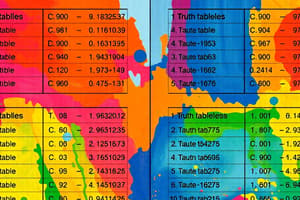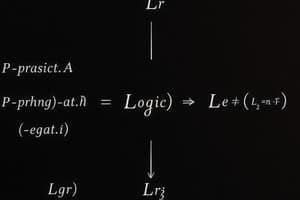Podcast
Questions and Answers
What is a proposition?
What is a proposition?
A declarative sentence that is either True or False.
Which of the following is an example of a proposition?
Which of the following is an example of a proposition?
- What time is it?
- Sit down!
- x + y = z
- The Moon is made of green cheese. (correct)
0 + 0 = 2 is a proposition.
0 + 0 = 2 is a proposition.
True (A)
What denotes the proposition that is always true?
What denotes the proposition that is always true?
What denotes the conjunction of propositions p and q?
What denotes the conjunction of propositions p and q?
In logical disjunction, p ∨ q is true only when both p and q are true.
In logical disjunction, p ∨ q is true only when both p and q are true.
What is the truth table for conjunction?
What is the truth table for conjunction?
What does the expression p → q express?
What does the expression p → q express?
The negation of a proposition p is denoted by _____
The negation of a proposition p is denoted by _____
What is the truth value of the implication p → q when p is false?
What is the truth value of the implication p → q when p is false?
What is the distinction between inclusive or and exclusive or in logic?
What is the distinction between inclusive or and exclusive or in logic?
Flashcards are hidden until you start studying
Study Notes
Propositions
- A proposition is a statement that is either true or false.
- Examples:
- The Moon is made of green cheese.
- Trenton is the capital of New Jersey.
- Toronto is the capital of Canada.
- 1 + 0 = 1
- 0 + 0 = 2
- Examples that are not propositions:
- Sit down!
- What time is it?
- x+1=2
- x + y = z
Propositional Logic
- Uses propositional variables (p, q, r, s...) to represent propositions.
- T represents always true propositions, and F represents always false propositions.
- Uses compound propositions (constructed from logical connectives and other propositions).
- Negation (¬): ¬p is the negation of p.
- Conjunction (∧): p ∧ q is the conjunction of p and q (both must be true).
- Disjunction (∨): p ∨ q is the disjunction of p and q (at least one must be true).
- Implication (→): p → q is the implication of p and q (if p is true then q must be true).
- Biconditional (↔): p ↔ q is the biconditional of p and q (p is true if and only if q is true).
Compound Propositions: Negation
- ¬p is the opposite of p.
- If p is "The earth is round," then ¬p is "The earth is not round."
Conjunction (∧)
- p ∧ q is true only when both p and q are true.
- If p is "I am at home," and q is "It is raining," then p ∧ q is "I am at home and it is raining."
Disjunction (∨)
- p ∨ q is true when at least one of p or q is true.
- If p is "I am at home," and q is "It is raining," then p ∨ q is "I am at home or it is raining."
The Connective Or in English
- In English, "or" can have two meanings:
- Inclusive Or: (p ∨ q) Both p and q can be true.
- Exclusive Or (Xor): (p ⊕ q ) Only one of p and q can be true.
Implication (→)
- p → q means "if p, then q."
- p is the hypothesis (antecedent or premise)
- q is the conclusion (or consequence).
- Example: If p is "I am at home", and q is "It is raining," then p → q is "If I am at home, then it is raining."
- Implication does not require any connection between the antecedent or the consequent, their truth values determine the truth value of p → q.
Understanding Implication (cont..)
- Implication can be viewed as an obligation or contract:
- "If I am elected, then I will lower taxes." (If the politician is elected and does not lower taxes, then the implication is false).
- "If you get 100% on the final, then you will get an A." (If the student gets 100% on the final, but does not receive an A, then the implication is false).
Studying That Suits You
Use AI to generate personalized quizzes and flashcards to suit your learning preferences.




